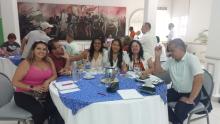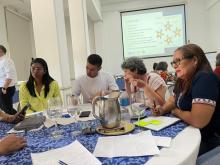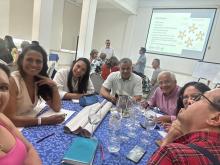Transforming the training of the future: Workshops on transversal competences - SENA Agreement 2024
From 7 to 12 October 2024, two workshops were held for a group of SENA trainers of trainers, as part of the activities of the ILO/Cinterfor - SENA 2024 Agreement. These workshops focused on strengthening transversal competencies, considered fundamental to face the challenges of a labour market in constant transformation.
The main purpose was to introduce strategies to effectively integrate the different dimensions of competencies: knowledge, skills and attitudes. In this sense, transversal competencies represent one of the greatest challenges, as they demand innovative and holistic approaches.
ILO/Cinterfor presented methodologies for the design of learning sequences that promote a holistic view of competencies, transcending the traditional approach that separates theory and practice and leaving aside the attitudinal.
Why transversal competences??
Rapid technological evolution has changed what the labour market demands: beyond technical skills, abilities such as critical thinking, problem solving and adaptability are now valued. These essentially human competences are the key to ensuring employability and professional success in a constantly changing environment. Teachers, as facilitators of learning, have a crucial role to play in preparing young people for an uncertain future through educational approaches that foster creativity, collaboration and resilience.
Methodology
Through innovative dynamics and digital tools, the workshops offered a transformative learning space:
-
Workshop 1: Development of transversal competences (7 to 9 October)
It focused on discussing the necessary balance between content and learning activities for a holistic development of competence, integrating reflective and participatory activities. Participants experienced dynamics such as Café Mundo and Crowdsourcing to work on competences in a holistic approach. -
Workshop 2: Development of cross-cutting components of competence in virtual media (10-12 October)
It focused on the development of strategies for training in digital media and hybrid environments. With exercises such as SCAMPER and the analysis of digital tools, teachers explored how to bring these dynamics into the virtual classroom.
Participants were able to:
- Apply learning design strategies that develop the technical and cross-cutting elements in an integrated way.
- Identify the role of participatory learning activities and reflective activities in achieving the above objective.
- Select innovative participatory and reflective dynamics for the design of activities in face-to-face and virtual environments.
- Mastering key digital tools for successful hybrid teaching.
These meetings not only offered practical tools, but also promoted a deep reflection on the role of trainers in today's world.







